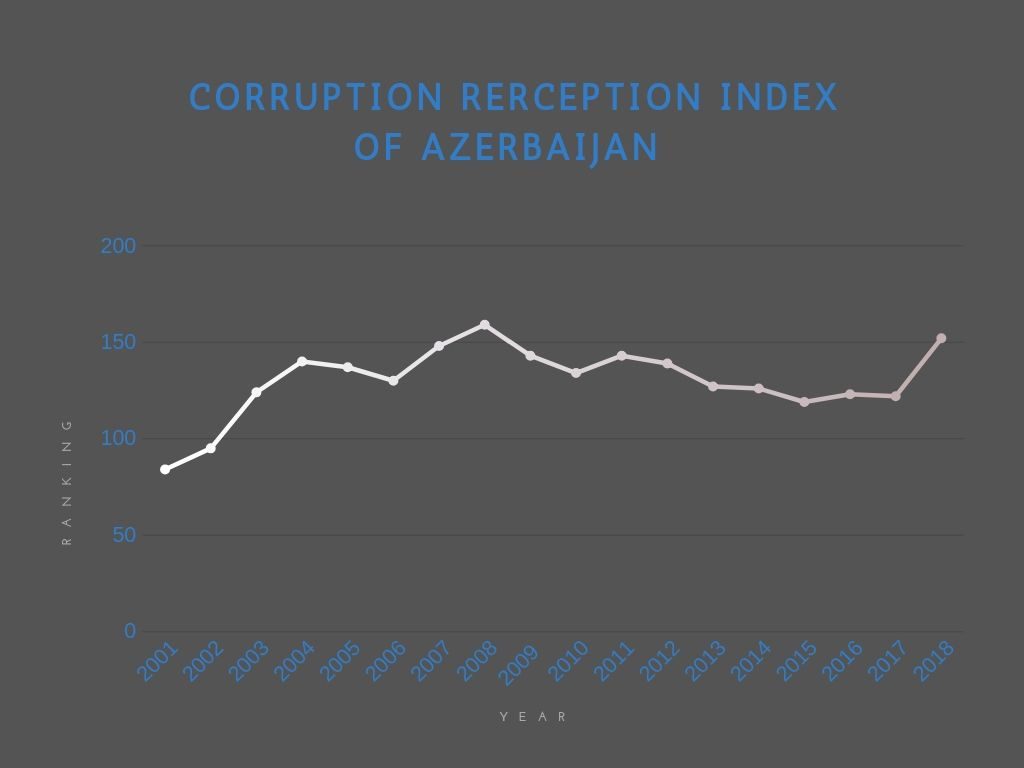In the past year, Azerbaijan received very low ratings in Transparency International’s Corruption Perception Index and in the 2018 Open Budget Index. Low ratings harm the country’s image and make investments into the country more difficult. Interestingly, ranking in the Corruption Perception Index correlate strongly with annual oil revenues, with the country scoring the worst during peak oil years. Legislative protection of civic oversight of budget transparency and other independent corruption related monitoring is imperative to improve Azerbaijan’s image and international corruption ratings.
About the Author: Gubad Ibadoghlu, Senior Policy Analyst for social and economic studies at Azerbaijan’s Economic Research Center, a Baku-based NGO that promotes economic development and good governance.
In 2018, Azerbaijan dropped 30 places in just one year in the Corruption Perception Index, ranking 152nd out of 180 countries[1].
Along with that, Azerbaijan scored only 34 points from possible 100 in the 2018 Open Budget Index[2]. Azerbaijan ranked 78th out of 115 countries, dropping to the group of countries with minimum degree of budget openness. In comparison, the country scored 51 points in the assessment of the 2015 budget, carried out in 2017.
There is a strong, positive correlation between the scope of corruption and oil revenues. The Corruption Perception Index of Azerbaijan in the following table demonstrates that Azerbaijan’s corruption index has is the worst during the peak years of oil revenues (2008-2012). This deep dive of the country’s corruption index is linked to non-transparent expenses of the state budget, which is mainly comprised of the oil revenues.

Up to 40% of the state budget expenditure is not classified, and the final objectives of these expenses are not known during budget creation. This allowed for a high potential for corruption in spending of oil money.
As an example, total profit from the Azeri, Chiraq and Gunashli (ACG) oil reservoir since 2001 has been USD140.450 billion. Over USD 100 billion of this money was transferred to the state budget and financing of strategic projects.
This high degree of corruption, linked to the extractive industries, in turn negatively affects other indexes , including the World Bank Governance Indicators.
Since Azerbaijan left the Extractive Industries Transparency Initiative in 2017, access to information in the sphere of management of oil revenues and transparency and accountability standards has dramatically decreased.
Azerbaijan has refused to participate in international initiatives such as beneficial ownership, accountability of projects, contract transparency and transparency of purchase contracts on raw materials.
Why we should care about these indexes?
Lack of transparency and a high degree of corruption in Azerbaijan harms the image of the country, damages the reputation of the state, and worsens its credit rating making investment into the country more difficult.
Corruption makes the people of the country poorer. Unfair division of oil and gas revenues and wealth leads to severe stratification of the population. Thus, corruption risks related to oil revenues create dangers to the country’s stability.
Although ensuring transparency and accountability in Azerbaijan has been discussed for a long time, problems in this area continue to increase.
What needs to be done to improve corruption indicators?
The fight against corruption in Azerbaijan must be strengthened. It is necessary to ensure independence of judiciary, the restoration of the 2010 status-quo of free press and the 2014 status-quo of civil society.
Restrictions on independent civil society and independent media in the country harm the country’s indicators, as do unfair trials, and the inability of the judiciary to expose and investigate corruption.
Legal protection for whistleblowers fighting corruption is imperative, and relevant legislation should be adopted in the Competition Code to prevent conflicts of interests.
Application of the code of honor of State officials should be enforced, including the declaration of family revenues and property of the president, the prime minister, members of the Cabinet of Ministers and Parliament.
Public participation and civic activism must increase to effectively fight corruption. Civic social audits must be legally protected through relevant working mechanisms and legislation. Only then would it be possible to gain any success in the fight against corruption with the participation of the society as a whole.
[1] https://www.transparency.org/country/AZE
[2] https://www.internationalbudget.org/open-budget-survey/results-by-country/country-info/?country=az

